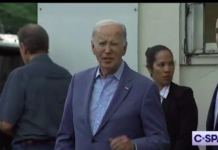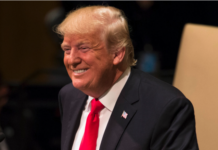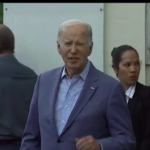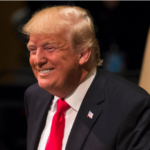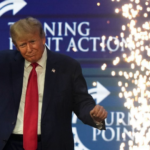It’s not every day that Manhattan District Attorney Alvin Bragg gets tough on crime, but here we are with the case of Luigi Mangione—the man charged with assassinating UnitedHealthcare CEO Brian Thompson. Bragg, known for his light touch on violent offenders, seems ready to throw the book at Mangione. And for once, we’re not complaining. The murder of a high-profile executive on a Manhattan street is exactly the sort of brazen, calculated act that demands the full weight of the justice system.
Mangione’s alleged crime reads like something out of a Hollywood thriller. According to prosecutors, this wasn’t a random act of violence but a meticulously planned assassination. Mangione reportedly traveled to New York on a mission, checked into a hostel under a fake name, and waited for his target outside the Hilton hotel. Surveillance footage captured the masked killer shooting Thompson from behind before fleeing on a bike. Days later, Mangione was found in Pennsylvania with a 9mm handgun, suppressor, ammunition, and a 3D-printed weapon—a grab bag of gear that screams premeditation.
And then there’s the bizarre notebook entry allegedly found in Mangione’s possession. Referring to Thompson as the “CEO at the annual parasitic bean-counter convention,” Mangione reportedly justified his actions as targeted and precise, avoiding “innocents.” It’s chilling and deeply troubling—and it should send a strong signal about the rise of ideologically motivated violence.
Bragg and NYPD Commissioner Jessica Tisch aren’t wrong to decry attempts to lionize Mangione. Let’s be clear: no amount of corporate criticism justifies cold-blooded murder. Yet, as Tisch noted, some have tried to cast Mangione as a vigilante striking a blow against big business. This kind of twisted hero narrative undermines justice and rationalizes acts of terror. If someone’s grievances with the healthcare system lead them to target its executives for assassination, that’s not activism—it’s sociopathy.
“This was a frightening, well-planned, targeted murder that was intended to cause shock and attention and intimidation,” Bragg said. “It occurred at one of the most bustling parts of our city, threatening the safety of local residents and tourists alike.”
Of course, no press conference in New York is complete without a nod to “ghost guns,” the Left’s favorite term for untraceable firearms. Bragg and Tisch used the case to double down on their calls for stricter gun control, though it’s hard to imagine how more laws would have stopped Mangione’s 3D-printed weapon or his fake ID. Criminals, by definition, don’t follow the rules. What’s needed is enforcement of existing laws—not endless attempts to disarm law-abiding citizens.
Luigi Mangione shoots the healthcare CEO in New York and the Left celebrates and makes candles worshipping him.
A psychopath shoots up a school in Wisconsin and the Left calls for gun control.
Are we starting to understand their outrage about guns is 100% fake?
— Joey Mannarino (@JoeyMannarinoUS) December 16, 2024
And speaking of enforcement, Mangione’s extradition fight is dragging things out, but he’s delaying the inevitable. His attempts to avoid facing New York justice only highlight the seriousness of his alleged crime. Whether it’s the notebook, the weaponry, or the damning surveillance footage, the evidence seems stacked against him. Once he’s back in Manhattan, Bragg’s newfound zeal for prosecution will be put to the test. After all, the maximum penalty for first-degree murder is life without parole—an outcome that would bring at least some measure of justice for Thompson’s senseless killing.
Nearly two weeks after the murder of UnitedHealthcare CEO Brian Thompson, a grand jury indicted suspect Luigi Mangione, upgrading charges to first-degree murder in “furtherance of terrorism.” @AaronKatersky has details. https://t.co/fCWVOuLEsj pic.twitter.com/bu7xcPHYHb
— World News Tonight (@ABCWorldNews) December 18, 2024
For now, the focus remains on ensuring Mangione faces trial and accountability. But let’s not lose sight of the broader issues here. Violence, no matter how carefully targeted or ideologically justified, has no place in a civilized society. And if Bragg and his team can deliver a swift and decisive case against Mangione, perhaps they’ll finally send a message that New York is serious about punishing those who threaten its residents—whether they’re CEOs or everyday citizens.

